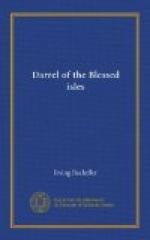“’In that old trunk there under the bed is a dusty, moulding, cursed heap o’ money done up in brown paper an’ tied with a string. It is a hundred thousand dollars, an’ the price o’ me soul.’
“‘An’ thou in rags an’ a garret,’ said I.
“‘An’ I in rags an’ hell,’ said he, sor, looking down at himself.
“He drew out the trunk an’ showed me the money, stacks of it, dirty, an’ stinking o’ damp mould.
“‘There it is,’ said he, ’every dollar I stole is there. I brought it with me an’ over these hundreds o’ miles I could hear the tongue o’ gossip. Every night as I lay down I could hear the whispering of all the people I ever knew. I could see them shake their heads. Then came this locket o’ gold.’
“A beautiful, shiny thing it was, an’ he took out of it a little strand o’ white hair an’ read these words cut in the gleaming case:—
“‘Here are silver an’
gold,
The one for a day o’ remembrance
between thee an’ dishonour,
The other for a day o’ plenty between
thee an’ want.’
“It was an odd thought an’ worth keeping, an’ often I have repeated the words. The silvered hair, that was for remembrance; an’ the gold he might sell and turn it into a day o’ plenty.
“‘In the locket was a letter,’ said the poor man. ‘Here it is,’ an’ he held it in the light o’ the candle. ’See, it is signed “mother."’
“An’ he read from the letter words o’ sorrow an’ bitter shame, an’ firm confidence in his honour,
“‘It ground me to the very dust,’ he went on. ’I put the money in that bundle, every dollar. I could not return it, an’ so confirm the disgrace o’ her an’ all the rest. I could not use it, for if I lived in comfort they would ask—all o’ them—whence came his money? For their sake I must walk in poverty all me days. An’ I went to work at heavy toil, sor, as became a poor man. As God’s me judge I felt a pride in rags an’ the horny hand.’”
The tinker paused a moment in which all the pendulums seemed to quicken pace, tick lapping upon tick, as if trying to get ahead of each other.
“Think of it, boy,” Darrel continued. “A pride in rags an’ poverty. Bring that into thy book an’ let thy best thinking bear upon it. Show us how patch an’ tatter were for the poor man as badges of honour an’ success.
“‘I thought to burn the money,’ me host went on. ’But no, that would have robbed me o’ one great possibility—that o’ restoring it. Some time, when they were dead, maybe, an’ I could suffer alone, I would restore it, or, at least, I might see a way to turn it into good works. So I could not be quit o’ the money. Day an’ night these slow an’ heavy years it has been me companion, cursing an’ accusing me.
“‘I lie here o’ nights thinking. In that heap o’ money I seem to hear the sighs an’ sobs o’ the poor people that toiled to earn it. I feel their sweat upon me, an’ God! this heart o’ mine is crowded to bursting with the despair o’ hundreds. An’, betimes, I hear the cry o’ murder in the cursed heap as if there were some had blood upon it. An’ then I dream it has caught fire beneath me an’ I am burning raw in the flame.’”




